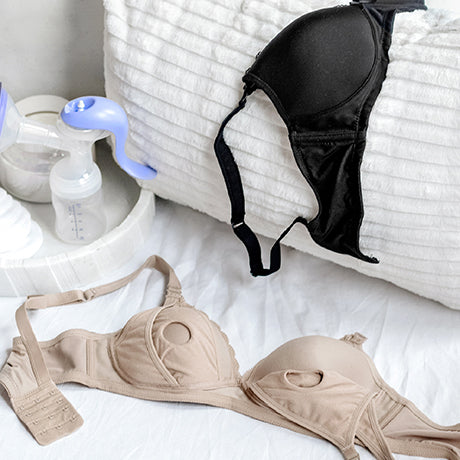Breastfeeding Support in Hospitals
 In the past decade the U.S. has made impressive strides in improving breastfeeding support in hospitals. This critical time just after birth may set the stage for breastfeeding success, which is why it is vital for hospitals to provide adequate breastfeeding support for new moms. Unfortunately only 14% of the 4 million babies born each year are welcomed in hospitals designated as “Baby-Friendly” as prescribed by the World Health Organization and UNICEF and supported by the CDC. “Baby-Friendly” hospitals follow 10 guidelines that promote and support breastfeeding and the best health practices for newborns.
In the past decade the U.S. has made impressive strides in improving breastfeeding support in hospitals. This critical time just after birth may set the stage for breastfeeding success, which is why it is vital for hospitals to provide adequate breastfeeding support for new moms. Unfortunately only 14% of the 4 million babies born each year are welcomed in hospitals designated as “Baby-Friendly” as prescribed by the World Health Organization and UNICEF and supported by the CDC. “Baby-Friendly” hospitals follow 10 guidelines that promote and support breastfeeding and the best health practices for newborns.
Some of the most important steps for breastfeeding support in hospitals are: educating new moms on the benefits of breastfeeding, initiating breastfeeding within an hour of birth, encouraging rooming-in so mothers and babies bond quickly, breastfeeding on-demand to help establish milk supply, providing lactation support to ensure moms understand the mechanics of breastfeeding, and avoiding supplementation unless there is a true critical need.
Breastfeeding support in hospitals begins before moms even give birth. Over 90% of hospitals offer prenatal breastfeeding classes so mothers can become familiar with the benefits of breastfeeding and how it works. Although breastfeeding is best learned with hands-on experience, being mentally prepared is a good way to enter the game.
Once a mother is in the hospital ready to give birth, sharing her plans to breastfeed is crucial so her OBGYN and nurses can help ensure the earliest possible breastfeeding opportunity. In best case scenarios, this occurs within a few minutes after birth once the baby and mother are both in stable condition.
Mothers may want to reiterate their desire to breastfeed to each nurse who comes on shift to ensure there is no accidental supplementation throughout the hospital stay. Some moms request a sign is put on the baby’s hospital basinet saying BREASTFED ONLY. This reduces the chance of mistakes when the baby is taken to the nursery for exams or to allow mom a few hours of rest.
If the hospital staff recommends supplementation out of concern for the baby, it is completely acceptable for mothers to seek the advice of their pediatrician before making a decision. Breastfeeding support in hospitals should give mothers every opportunity to provide the entirety of a baby’s nourishment through breast milk if that is her choice.
Sometimes that means that moms need help with the mechanics of breastfeeding. Many anti-partum nurses are knowledgeable about breastfeeding and can help mothers position their babies, initiate proper latch and develop best practices. If additional help is needed, mothers should request visits from the on-staff lactation consultants. These professionals usually make rounds to help moms who are struggling with breastfeeding. Because they may see many moms in a day, it is important for new moms wishing to see a lactation consultant to be vocal early and often. Breastfeeding challenges can escalate quickly and often lead to early discontinuation of breastfeeding. If the problems are addressed immediately, issues like sore nipples or poor latch can be corrected.
During her time in the hospital a mother has the first opportunity to be her baby’s advocate. For a baby’s health, there is no better cause than breastfeeding. Mothers should seek breastfeeding support in hospitals to ensure success for a strong and healthy breastfeeding journey.
Sources: CDC and LiveScience
The post Breastfeeding Support in Hospitals appeared first on Leading Lady.





